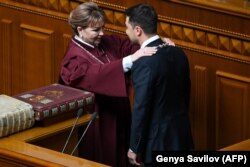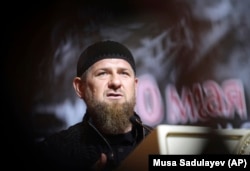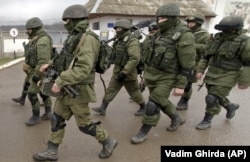On Monday, May 20, Volodymyr Zelenskiy was sworn in as Ukraine’s sixth president, marking the second peaceful transfer of power in the country since Russia seized the Crimean peninsula in 2014 and fomented conflict in the country’s eastern Donbas region.
Polygraph.info video fact check by Nik Yarst.
During his speech before parliament, Zelenskiy said his first task would be to end the war in Donbas, which has resulted in the deaths of 13,000 people and wounding of more than 30,000 others.
That statement was met with a standing ovation.
“History is not fair, that's true. It wasn't us who started this war, it wasn't us. But it's our job to end it. And we're ready for a dialogue,” Zelenskiy said.
The head of the Chechen Republic, Ramzan Kadyrov, used the Telegram messaging service to express discontent with Zelenskiy’s statement, the Russian state news agency RIA Novosti reported.
Kadyrov said Zelenskiy’s inauguration speech had likely been “edited abroad,” otherwise he “would not be making belligerent statements on the first day” of his presidency “threatening to seize the territory of a neighboring state.”
The Chechen leader was referring to the Crimean peninsula, which he said "was, is, and forever will be an integral part of Russia."
Polygraph.info has repeatedly checked false claims that Russia is not occupying Ukrainian territory.
But did Zelensky threaten to take any territory, neighboring or otherwise, by force?
The Ukrainian president did say that, after ending the war in the Donbas, the next challenge was “the return of [Ukraine’s] lost territories,” adding that it was “impossible to lose something that rightfully belongs to us.”
“Both Crimea and [the Donbas region] are Ukrainian lands. We didn't just lose the territories, we lost the most important thing: the people,” Zelensky said.
That opinion was backed up by the March 27, 2014 United Nations General Assembly Resolution 68/262. It stated that the Russian-led referendum to annex Crimea, carried out under military occupation, had “no validity” and “cannot form the basis for any alteration of the status of the Autonomous Republic of Crimea or of the city of Sevastopol.”
The resolution urged all countries “not to recognize any alteration of the status” of Crimea, which the majority of the international community has adhered to.
While Zelenskiy spoke of winning back the “conscience” of the people in those areas whom the government had failed to make “feel Ukrainian,” he did not suggest “seizing” Crimea or otherwise regaining the peninsula via military action.
Polygraph.info therefore finds Kadyrov’s statement to be false.










